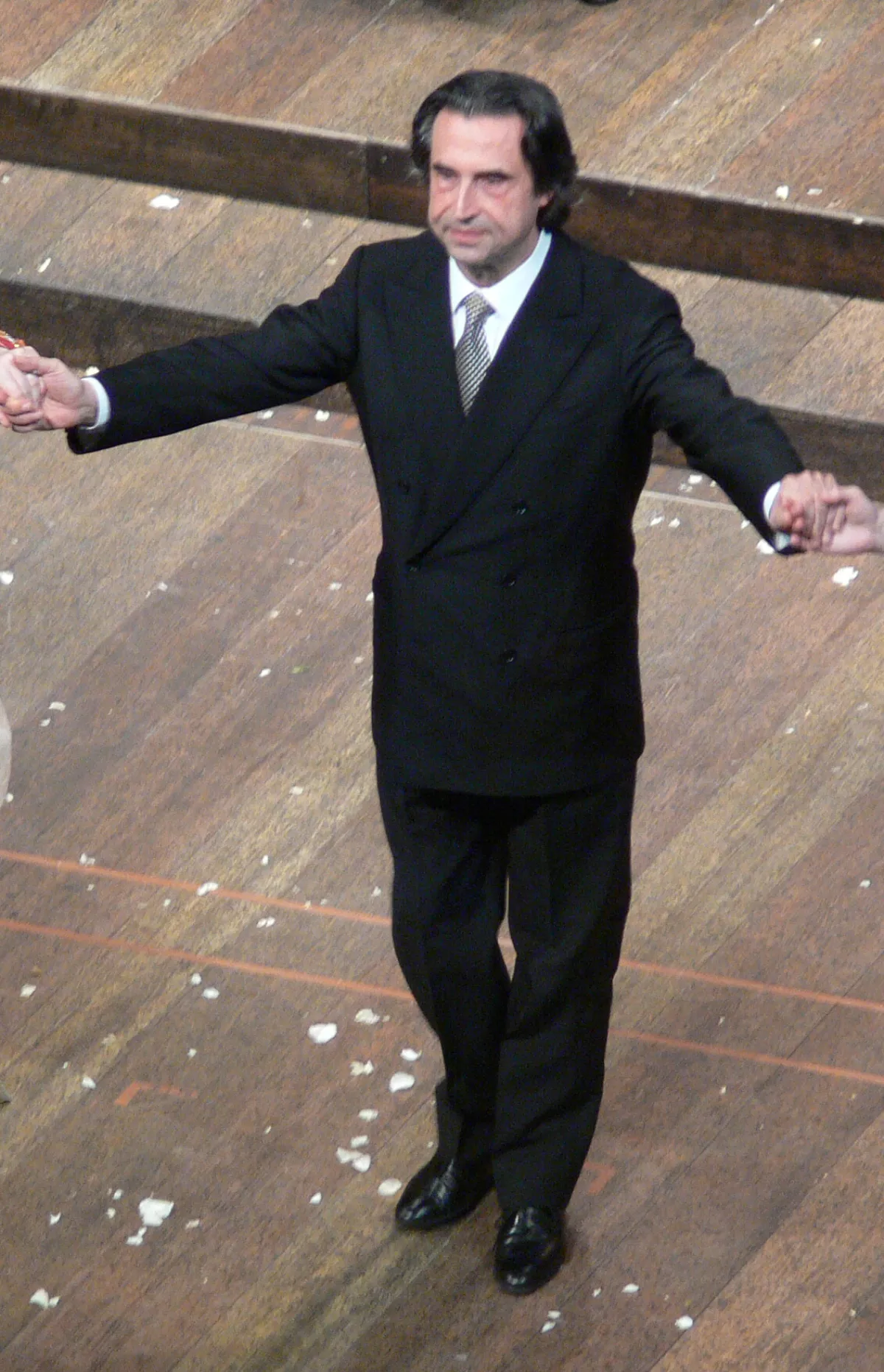 1.
1. Riccardo Muti is current music director of the Orchestra Giovanile Luigi Cherubini.

 1.
1. Riccardo Muti is current music director of the Orchestra Giovanile Luigi Cherubini.
Riccardo Muti was named Music Director Emeritus in Chicago in 2023.
Riccardo Muti is especially associated with the music of Giuseppe Verdi.
Riccardo Muti was born in Naples but he spent his early childhood in Molfetta, near Bari, in the long region of Apulia on Italy's southern Adriatic coast.
Riccardo Muti's father, Domenico, was a pathologist in Molfetta, as well as an amateur singer and great music lover; his mother, Gilda, was a reserved and severe Neapolitan woman with five children.
Riccardo Muti was awarded a diploma in Composition and Conducting by the Giuseppe Verdi Conservatory, Milan, where he studied with the composer Bruno Bettinelli and the conductor Antonino Votto.
Riccardo Muti has studied composition with Nino Rota, whom he considers a mentor.
Riccardo Muti was unanimously awarded first place by the jury of the "Guido Cantelli Competition for Conductors" in Milan in 1967 and became, the next year, principal conductor and music director of the Maggio Musicale Fiorentino, a post he held for eleven years.
From 1972 Riccardo Muti regularly conducted the Philharmonia Orchestra in London and in 1973 he was appointed its principal conductor, succeeding Otto Klemperer.
In 1979, Riccardo Muti became the music director and principal conductor of the Philadelphia Orchestra.
Riccardo Muti has been a regular guest of the Berlin Philharmonic and the Vienna Philharmonic.
Riccardo Muti has led the orchestra's Vienna New Year's Concert on seven occasions to date: in 1993,1997,2000,2004,2018,2021 and 2025.
Apart from his work at Milan's Teatro alla Scala, where he was music director for 19 years, Riccardo Muti has led operatic performances with the Philadelphia Orchestra and productions in the principal opera houses of Rome, Ravenna, Vienna, London, Munich, and, finally, in 2010, New York.
Riccardo Muti first conducted at the Salzburg Festival in 1971 with Donizetti's Don Pasquale.
In 2011, Riccardo Muti conducted a new production of Verdi's Macbeth, which was directed by Peter Stein.
From 2007 to 2011, Riccardo Muti was the artistic director of the Salzburg Whitsun Festival.
Riccardo Muti conducted productions of rare Italian operas from the 18th century Neapolitan School as well as concerts, with the Luigi Cherubini Youth Orchestra, which he had founded.
Riccardo Muti stated that his approach was to remain faithful to the intent of the composer.
Riccardo Muti had been a regular and popular guest conductor with the New York Philharmonic.
Riccardo Muti had first guest-conducted the Chicago Symphony Orchestra in 1973 at the Ravinia Festival but did not return as a guest conductor with the CSO until 2007.
Riccardo Muti was forced to cancel a concert prior to the vote, and some other productions were disrupted at the theatre because of continuing rifts with Fontana's supporters.
Alemanno, instead, announced in October 2011 that Riccardo Muti accepted an invitation by the Orchestra of Opera di Roma to become a "lifetime conductor" of Opera di Roma.
Riccardo Muti, who had stated that it had been the first time in his life that he conducted chorus and audience together and the last, on that occasion conducted the Verdi opera in the "orthodox" manner.
Riccardo Muti is married to Maria Cristina Mazzavillani, the founder and director of the Ravenna Festival.
Riccardo Muti is considered one of the world's greatest conductors of the operas of Verdi.
Riccardo Muti led a series of annual performances of opera in concerts including the works of Verdi, Puccini, Mozart and Wagner.
In 1992, Riccardo Muti conducted performances of Leoncavallo's Pagliacci with Luciano Pavarotti.
At La Scala, Riccardo Muti was noted for exploring lesser-known works of the Classical- and early Romantic-era repertory such as Lodoiska by Cherubini and La vestale by Spontini.